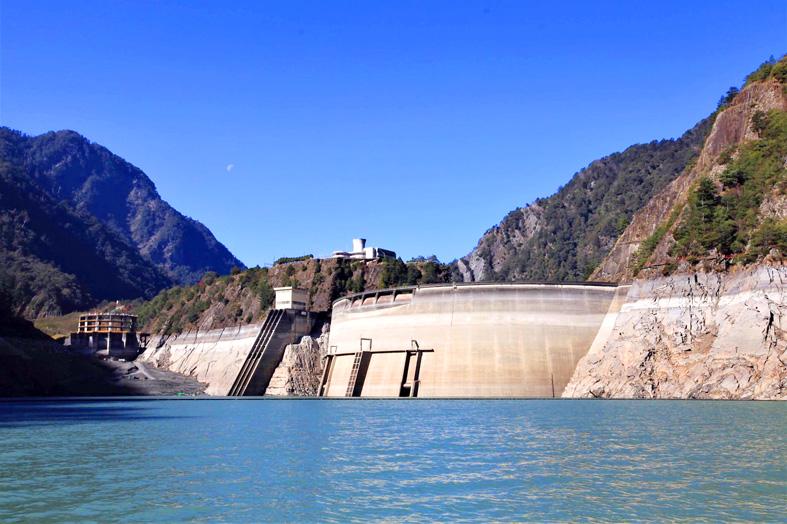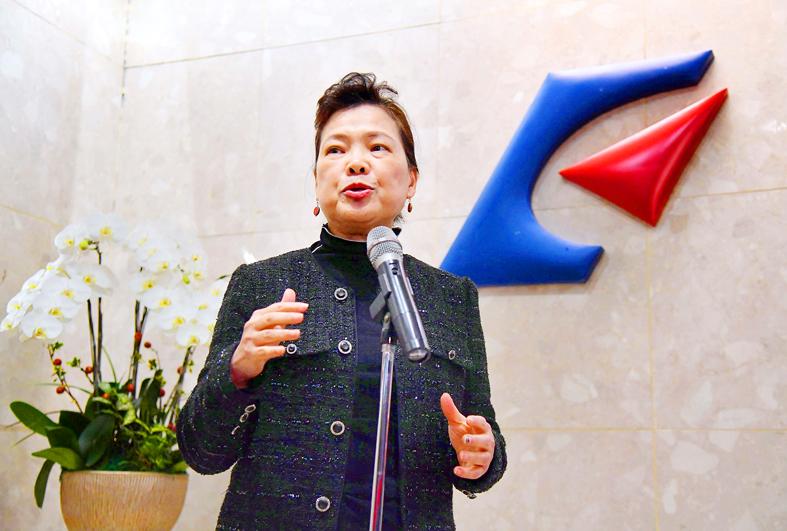After a typhoonless year and an unusually dry spell in the first quarter, Taiwan is counting on alternative sources of water to ensure a steady supply until the arrival of the wet season, Minister of Economic Affairs Wang Mei-hua (王美花) said yesterday.
Wang also defended the ministry’s strategy of proactively developing emergency wells to increase the nation’s water supply, including granting permission to companies in the Hsinchu Science Park (新竹科學園區) to drill wells.
No possible alternative source of water will be overlooked, including wells, desalination and water reclamation, she said.

Photo: CNA
“This is undoubtedly the most serious drought since 1967,” Wang told a press briefing. “We usually get an average of more than 100mm of spring rain, but so far this year, we only had 20mm,” she said.
Spring rain refers to rainfall from February to April.
“The reason we still have water now is because we have been prepared,” she said. “We have increased our backup water supply and used pipelines to transport water where it is needed.”

Photo: CNA
Wang’s remarks came after water levels in six reservoirs across the nation fell below 20 percent of capacity, despite rainfall in the past few days.
As of 12pm yesterday, the water levels at Baoshan Second Reservoir (寶二水庫) in Hsinchu County, as well as Yongheshan Reservoir (永和山水庫), Mingde Reservoir (明德水庫) and Liyutan Reservoir (鯉魚潭水庫) in Miaoli County, were at 12.43 percent, 11.81 percent, 10.64 percent and 15.08 percent of capacity respectively, while Deji Reservoir (德基水庫) in Taichung and Zengwen Reservoir (曾文水庫) in Chiayi were at 10.19 percent and 15.22 percent of capacity, figures from the Water Resources Agency showed.
Wang said the government has spent NT$1.96 billion (US$69.25 million) on drought-prevention measures since 2018 amid concern over climate change-related extreme weather patterns.
The nation’s 1,200 emergency wells were surveyed and 87 new wells were dug, while 160 emergency wells are currently in use, she said.
A pipeline also carries water from Taoyuan to Hsinchu, where the water situation has reached “orange alert” levels and water pressure has been reduced around the clock, she said.
Some have said that relying on wells is a shortsighted solution that could have unintended consequences.
Former minister of the interior Lee Hong-yuan (李鴻源) said on TV that it could cause land subsidence.
“The science park uses at least 200,000 to 300,000 tonnes of water a day,” Lee said on the Direct Interaction Live (互動直播LIVE) program. “What if satisfying this supply with groundwater causes land subsidence? Would it damage precision manufacturing equipment in the park? Who will take responsibility for the possible consequences?”
Wang said the request to drill more wells came straight from the Hsinchu Science Park firms and only wells in areas with “plentiful groundwater supply and without risk of subsidence” would be approved.
Emergency wells in Hsinchu would only be used to cover an emergency shortfall rather than for daily use, Water Resources Agency Deputy Director-General Wang Yi-feng (王藝峰) said.
Once approved, an emergency well would take about 50 days to dig, he said.
As climate change causes extreme weather patterns, Taiwan’s long-term plan to increase its backup water supply goes beyond wells, Wang Yi-feng said.
“We have 11 water reclamation projects that are ongoing. We expect at least one new facility to come online every year,” he said.
Currently, only one water reclamation plant in Kaohsiung’s Fongshan District (鳳山) is operational, producing 45,000 tonnes of water a day for China Steel Co (中鋼), he added.
The nation is still on track to provide adequate water for household and industrial users until the end of May, when the rainy season starts, the minister said.
Meteorologists have forecast that rainfall next season would be “average to trending low,” she said.

MAKING WAVES: China’s maritime militia could become a nontraditional threat in war, clogging up shipping lanes to prevent US or Japanese intervention, a report said About 1,900 Chinese ships flying flags of convenience and fishing vessels that participated in China’s military exercises around Taiwan last month and in January have been listed for monitoring, Coast Guard Administration (CGA) Deputy Director-General Hsieh Ching-chin (謝慶欽) said yesterday. Following amendments to the Commercial Port Act (商港法) and the Law of Ships (船舶法) last month, the CGA can designate possible berthing areas or deny ports of call for vessels suspected of loitering around areas where undersea cables can be accessed, Oceans Affairs Council Minister Kuan Bi-ling (管碧玲) said. The list of suspected ships, originally 300, had risen to about 1,900 as

Japan’s strategic alliance with the US would collapse if Tokyo were to turn away from a conflict in Taiwan, Japanese Prime Minister Sanae Takaichi said yesterday, but distanced herself from previous comments that suggested a possible military response in such an event. Takaichi expressed her latest views on a nationally broadcast TV program late on Monday, where an opposition party leader criticized her for igniting tensions with China with the earlier remarks. Ties between Japan and China have sunk to the worst level in years after Takaichi said in November that a hypothetical Chinese attack on Taiwan could bring about a Japanese

Right-wing political scientist Laura Fernandez on Sunday won Costa Rica’s presidential election by a landslide, after promising to crack down on rising violence linked to the cocaine trade. Fernandez’s nearest rival, economist Alvaro Ramos, conceded defeat as results showed the ruling party far exceeding the threshold of 40 percent needed to avoid a runoff. With 94 percent of polling stations counted, the political heir of outgoing Costa Rican President Rodrigo Chaves had captured 48.3 percent of the vote compared with Ramos’ 33.4 percent, the Supreme Electoral Tribunal said. As soon as the first results were announced, members of Fernandez’s Sovereign People’s Party

MORE RESPONSIBILITY: Draftees would be expected to fight alongside professional soldiers, likely requiring the transformation of some training brigades into combat units The armed forces are to start incorporating new conscripts into combined arms brigades this year to enhance combat readiness, the Executive Yuan’s latest policy report said. The new policy would affect Taiwanese men entering the military for their compulsory service, which was extended to one year under reforms by then-president Tsai Ing-wen (蔡英文) in 2022. The conscripts would be trained to operate machine guns, uncrewed aerial vehicles, anti-tank guided missile launchers and Stinger air defense systems, the report said, adding that the basic training would be lengthened to eight weeks. After basic training, conscripts would be sorted into infantry battalions that would take